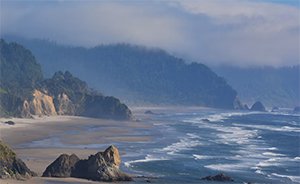Ocean and Plume Forum Examines Freshwater Conditions on Fish Survival in the Ocean
- February 25, 2022
- Deston Nokes

Insightful presentations followed by robust discussions characterized the Ocean and Plume Science and Management Forum, held virtually this past January 19. The goal of the Forum was for ocean researchers and managers to share ideas and take a closer look at how actions or conditions in freshwater affect the survival of salmon and steelhead through the marine portion of the life cycle.
Convened by Council Chair Guy Norman, the Forum drew 140 participants representing 40 organizations. Kris Homel, biologist for program performance, captured the highlights of the Forum for Council Members at the February Fish and Wildlife Committee Meeting.
Presentations included:
Trends in Salmon and Steelhead Abundance in the North Pacific
Laurie Weitkamp, with NOAA Fisheries Northwest Fisheries Science Center (NWFSC) in Newport, talked about variations in ocean regimes and their effect on salmon and the food web. One regime is the Pacific Decadal Oscillation (PDO), which is currently in a cold phase. Over the last 70 years, there have been pronounced shifts in the warm and cold phases of the PDO, and it has been associated with changes in returns from salmon and steelhead.
The presentation included data on marine heatwaves that caused exceptionally warm surface water and extremely low surface productivity. Better known as “The Blob,” these warm waters were prevalent in 2014–2016. At its peak, The Blob was 9.7 million square kilometers in size. But there were also heat waves in 2019, 2020, and 2021. Homel shared that this caused biological impacts to nonsalmonids, including harmful algal blooms, mortality events, and species range extensions.
What Does it Mean for Salmon and Steelhead?
There are mixed trends throughout the region for steelhead. The Fraser and Columbia rivers are on substantial downturns, and the Scott and Freshwater creeks in California show significant increases. Salmon trends also are complex and varied, Homel said.
Weitkamp compiled this information throughout the Pacific. It’s a pretty complex picture. Since 2015, 18 of the 25 trends show a decrease in abundance. But it varies. Looking at coho salmon across all regions, we see decreases. But pink salmon varies by region, showing increases and decreases. Homel said.
Cycles of Productivity in the Ocean
Brian Burke, with NWFSC – Seattle, talked about monitoring variations in ocean productivity. NOAA has conducted surveys off the Oregon and Washington coasts for over 20 years. Referring to a stoplight chart, Homel said there is an increase in salmon migrating to the ocean, and it’s a vast improvement over what we’ve seen in recent years.
Studying Impacts of High Seas Ecosystems
Mark Saunders, with the North Pacific Anadromous Fish Commission – Vancouver, B.C., and International Year of the Salmon, talked about understanding the changing impacts of high seas ecosystems on salmon and people. He shared exciting efforts to develop and test an international ocean intelligence system, which could inform decision-makers on ocean conditions now and in the future. An interesting tidbit is they are evaluating using drones to collect environmental DNA and gather oceanographic data.
The Impact of Carryover Effects
Lisa Crozier, with NWFSC – Seattle, introduced the topic of carryover effects and provided numerous examples from her research and that of her colleagues. Carryover effects look at how actions in freshwater carry over to salmonid ocean survival.
Examining Different Release Strategies
Brian Beckman, with NWFSC – Seattle, talked about linking changing ocean conditions to hatchery, rearing, and release strategies. Beckman proposes a single release of juvenile yearlings in the spring, called The Big Bet, where the goal is to maximize returns. Or there could be smaller releases during the year.
During the group discussion, forum attendees looked at carryover effects and actions that regional and hatchery managers take in freshwater to improve adult returns. There was talk about how new research is needed and a need for adaptive management in the context of climate change.
Homel said the group hopes to schedule the next Forum in January 2023.


